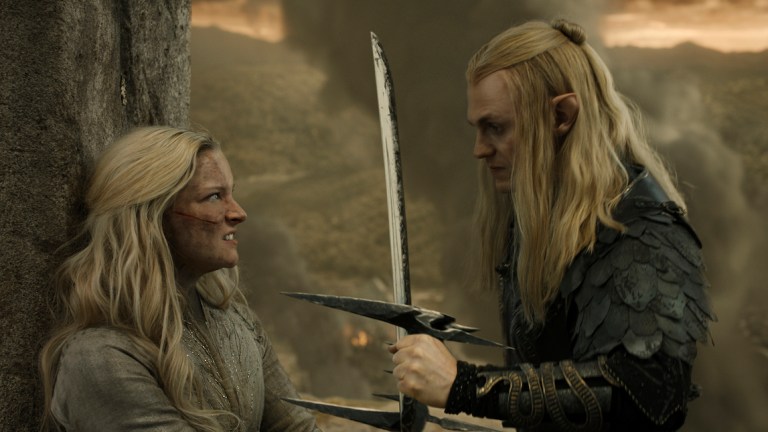The Rings of Power Season 2 Isn’t the End of Sauron and Galadriel: “They’ll Always Be Connected”
Exclusive: The Rings of Power star Charlie Vickers breaks down that climatic face-off between Sauron and Galadriel and what's next for these legendary rivals.

This Lord of the Rings article contains spoilers for The Rings of Power.
The Lord of the Rings: The Rings of Power wrapped up its second season in epic fashion, with a finale that contained everything from a massive battle sequence to several major character deaths. But, for many, the emotional crux of the hour is the moment when two of its biggest characters finally meet again: Sauron and Galadriel. The pair, who hadn’t shared the screen since the series’ first season finale, faced off in a climactic swordfight that left Galadriel seriously injured and Sauron firmly in possession of the nine rings of power destined to enslave the world of men.
Much of season 2 has been about reckoning with the idea that not only has Sauron returned, he spent a not insignificant amount of time living in disguise as the mysterious human Halbrand, allegedly a lost king of the Southlands who formed a deep emotional bond with Galadriel. Sure, there’s always the possibility that Sauron was playing a very long con with the elf commander—after all, you don’t get a nickname like the Great Deceiver without being exceptionally good at lying.
But they also spent a rather prodigious time fighting alongside one another and standing awfully close when they spoke, generating the sort of chemistry that implies that their bond is deeper and more complicated than hereditary enemies fighting for control of Middle-earth. And no matter what has happened between them since, that connection has never really gone away.
“They have a connection that’s above everyone else in the world,” Charlie Vickers, who plays Sauron, tells Den of Geek when we ask about the very hostile reunion in the season 2 finale. “It’s a connection that is really strong in both a positive, at least an initially positive, and then becomes quite a negative way for both of them. I think each one will drive the other to the limit.”
Perhaps it’s because the characters have been kept apart all season, but when the two finally face off in the forest outside Eregion, it certainly feels like fate in many ways.
“When they first meet again, it is kind of a, ‘look now here we are again’ thing,” Vickers says. “And from Sauron’s perspective, it’s well… if you had joined me, none of this would’ve happened. So you’ve really screwed up here.”
Galadriel has spent season 2 haunted by her failure to recognize Sauron’s deception, questioning her instincts and making a string of poorly considered tactical decisions. The show’s decision to switch the order of the forging of the Elvish rings of power—canonically, they are made last and in many ways in response to the forging of the other 16 rather than first as they are here—only increases the doubt and uncertainty surrounding both them and her position among her people. No one can be quite sure how much influence Sauron had in their creation when he was Halbrand, which leaves Gil-galad and Elrond suspicious of and uneasy about their abilities. Even Galadriel herself seems unsure about how much she can trust herself, a weakness Sauron does his best to exploit in the finale.
“How easily he says, ‘I know your mind,’” Vickers says. “It’s the same line that she reuses later in The Fellowship of the Ring. I think Halbrand is a symbol of that, for her, a reminder of her own weakness.”
Sauron spends much of their fight attempting to exploit that weakness, shifting into multiple forms meant to unsettle or tempt her throughout the battle—as Halbrand, Celebrimbor, and even Galadriel herself.
“As [he does] with Celebrimbor, I think he’s toying with her,” Vickers says. “Sauron has this hubris and arrogance, and he’s showing her his power and what he’s capable of.”
For the most part, Galadriel holds her own, repeatedly rejecting Sauron’s various temptations and taunts. There’s something almost cathartic about her furious refusal to bend, particularly given how virtually every other character she’s interacted with this season has called her weak, questioned her loyalties, or implied that she simply isn’t strong enough to resist him.
Sauron ultimately gets the upper hand, stabbing Galadriel with his infamous multi-pronged crown. But Galadriel remains unbowed even in the face of what feels like certain death, throwing herself—and the ring he’s been coveting—from a cliff rather than allow him to claim it—-or her. Of course, since this is a Lord of the Rings prequel, the viewers at home already know she’ll survive what seems like it ought to be a plummet to her doom. But according to Vickers, Sauron himself was also likely aware of that fact.
“When he stabs her, I think there has to be a part of him which realizes he’s not going to kill her,” Vickers says. “When she jumps off the cliff, he knows she’s going to live. Even though the crown has this supernatural ability, she’ll find a way to live.”
She has to, after all. And not just because Galadriel still has a great deal, canonically speaking, to accomplish in the world of Middle-earth. It’s because it seems impossible for Sauron’s story to continue without her. Because if there is one constant in The Rings of Power, it may be that Sauron and Galadriel will always find their way back to each other, locked in a cosmic conflict that will continue as long as either of them exist.
“I think that as long as the show goes on, right up until the end, it will be Sauron and Galadriel,” Vickers says. “I think they’ll always be connected, even if they’re not next to each other, even if they’re not in the same scene together. They are the enduring forces of good and evil.”
The Lord of the Rings: The Rings of Power is streaming now on Prime Video.

